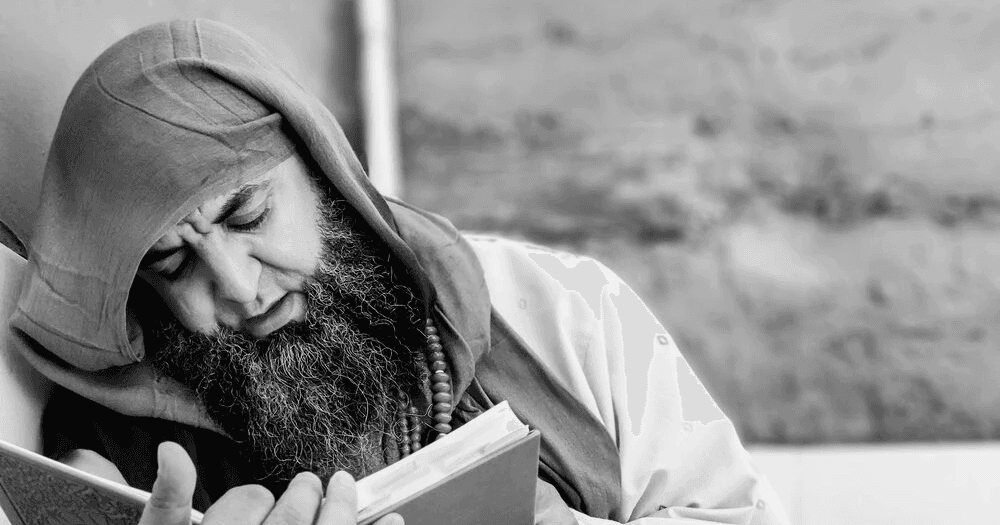Book
AN EXCERPT FROM
THE
FOUNDATIONS
OF THE
KARKARIYA
ORDER
The Foundations outlines the spiritual principles and practices of the Karkariya Sufi Order and their basis in the Quranand the Sunnah. It covers key concepts such as the Pact (al-ʿahd), the Sacred Dance (al-ḥaḍra), and the invocation of the Singular Name (al-ism al-mufrad), guiding disciples on their path to divine knowledge and spiritual growth.
By Shaykh Mohamed Faouzi al-Karkari
Translated from the Arabic
by Dr. Yousef Casewit, Khalid Williams,
and Jamil Zaghdoudi
Originally published by Les 7 Lectures
CHAPTER: The Pact (Al-ʿAhd)
In the Holy Qurʾān:
This word is mentioned forty-six times in the noble Qurʾān in a variety of etymological forms. These include the following verses:
God says: And [remember] when his Lord tried Abraham with [certain] words, and he fulfilled them. He said: ‘I am making you an imam for mankind.’ He said, ‘and of my prog- eny?’ He said, ‘My pact does not include the wrongdoers.’ (Q Baqara 2:124).
God says: It is not piety to turn your faces toward the east and west. Rather, piety is he who believes in God, the Last Day, the angels, the Book, and the prophets; and who gives wealth, despite loving it, to kinsfolk, orphans, the indigent, the traveler, beggars, and for [the ransom of ] slaves; and per- forms the prayer and gives the alms; and those who fulfill their pacts when they pledge them, and those who are patient in misfortune, hardship, and moments of peril. It is they who are the sincere, and it is they who are the reverent. (Q Baqara 2:177).
God says: It is not piety to turn your faces toward the east and west. Rather, piety is he who believes in God, the Last Day, the angels, the Book, and the prophets; and who gives wealth, despite loving it, to kinsfolk, orphans, the indigent, the traveler, beggars, and for [the ransom of ] slaves; and per- forms the prayer and gives the alms; and those who fulfill their pacts when they pledge them, and those who are patient in misfortune, hardship, and moments of peril. It is they who are the sincere, and it is they who are the reverent. (Q Baqara 2:177).
God says: Yea! Whosoever fulfills his pact and is reverent— truly God loves the reverent. (Q Āl ʿImrān 3:77).
God says: Truly those who sell God’s pact and their oaths for a paltry price, they shall have no share in the Hereafter, and God will not speak to them, nor will He look at them on the Day of Resurrection, nor will He purify them. And theirs shall be a painful punishment. (Q Āl ʿImrān 3:78).
God says: [...] Those who fulfill the pact with God and break not the covenant.(Q Raʿd 13:20).
God says: And approach not the orphan’s property, save in the most virtuous manner, till he reaches maturity. And ful- fill the pact; surely the pact is called to account. (Q Isrāʾ 17:34).
God says: They have no power of intercession, save the one who has made a pact with the All-Merciful. (Q Maryam 19:87).
God says: Then Moses returned to his people, angry and aggrieved. He said, ‘O my people! Did your Lord not make you a goodly Promise? Did the pact seem too long for you? Or did you desire that the anger of your Lord be unleashed upon you, such that you failed your tryst with me?’(Q Ṭā Hā 20:86).
God says: And We indeed made a pact with Adam afore- time, but he forgot. And We found no resoluteness in him.(Q Ṭā Hā 20:115).
God says: Did I not make a pact with you, O Children of Adam, that you not worship Satan—truly he is a manifest enemy unto you. (Q Yā Sīn 36:60).
In the Noble Hadith:
Mujāshiʿ, may God be pleased with him, narrated, “My brother and I came to the Prophet ﷺ and said, ‘Let us pledge allegiance to you for Migration (hijra).’ He ﷺ responded, ‘The [time for] Migration has come to an end.’ I asked, ‘Then on what terms will you accept our pledge of allegiance?’ He ﷺ replied, ‘Submission (islām) and struggle (jihād).’” (Bukhārī, Ṣaḥīḥ, K. al-Jihād, #2758).
Umm ʿAṭiyya, may God be pleased with her, narrated: “We pledged allegiance to God’s Messenger ﷺ, and he recited to us: [O Prophet! When believing women come unto thee, pledging unto thee] that they will not ascribe any partners unto God, [nor steal, nor fornicate, nor slay their children, nor bring a slanderous lie that they have fabricated between their hands and feet, nor disobey thee in anything honorable, then accept their pledge, and seek God’s Forgiveness for them. Truly God is Forgiving, Merciful.] (Q Mumtaḥina 60:12). And he forbade us from bewailing the dead, whereupon a woman withdrew her hand and said, ‘So-and-so lamented for one of my relatives, so I must repay her in kind.’ The Prophet ﷺ did not object, so she went off and later returned to the Prophet ﷺ, who accepted her pledge of allegiance.” (Bukhārī, Ṣaḥīḥ, K. tafsīr al-Qurʾān, #4540).
Junāda b. Abī Umayyad narrated, “We visited ʿUbāda b. al-Ṣāmit when he was ill and said to him: ‘May God restore your health! Narrate to us a hadith by which God will benefit us, and which you heard from God’s Messenger ﷺ.’ He replied, ‘God’s Messenger ﷺ called us, and we pledged allegiance to him. His terms included that we hear and obey him whether it be to our advantage or disadvantage, whether in adversity or prosperity, and even when someone is given preference over us, and without attempting to usurp authority from those to whom it is entrusted. He said: “except when you see a demonstrable display of unbelief, wherein God provides you with justification [to disobey].”’” (Muslim, Ṣaḥīḥ, K. al-Imāra, #3433).
Salama, may God be pleased with him, said: “‘I gave the pledge of allegiance [of al-Riḍwān] to the Prophet ﷺ, then moved to the shade of a tree. When the number of people around the Prophet ﷺ diminished, he said, ‘Ibn al-Akwaʿ, will you not pledge allegiance?’ I replied, ‘I already did, Messenger of God.’ He said, ‘Then do it again.’ So I pledged my allegiance to him a second time.” He was asked, “Abū Muslim, on what terms did you pledge allegiance on that day?” Salama replied, “On our lives.” (Bukhārī, Ṣaḥīḥ, K. al-Jihād waʾl-Siyar, #2756).
Yasār narrated: “I can still picture myself on the Day of the Tree, holding a branch over the Prophet’s ﷺ head as he took the oath of allegiance from the people. There were fourteen hundred of us. We did not pledge allegiance on our lives, but we pledged that we would not flee from battle.”(Muslim, Ṣaḥīḥ, K. al-Imāra, #3433).
ʿAbd Allāh b. ʿUmar, may God be pleased with him, said, “‘When we pledged our allegiance to God’s Messenger ﷺ to hear and obey, he would tell us: ‘as well as you are able.’”(Bukhārī, Ṣaḥīḥ, K. Tafsīr al-Qurʾān, #6691).
Jarīr b. ʿAbd Allāh said: “I pledged my allegiance to God’s Messenger ﷺ to perform the prayers, pay the zakāt, and offer sincere counsel to every Muslim.”(Bukhārī, Ṣaḥīḥ, K. al-Ṣalāt, #496).
ʿUbāda b. al-Ṣāmit, may God be pleased with him, said: “I was one of the chiefs who pledged allegiance to God’s Messenger ﷺ. We pledged not to associate partners with God, steal, fornicate, take a life that is forbidden by God, rob, or disobey. Paradise would be our reward if we kept this pledge; but if we were to commit any of these sins, then God would pass judgment upon us.”(Bukhārī, Ṣaḥīḥ, K. al-Manāqib, #3630).
Muʿāwiya b. Qurra reported that his father said: “I came to God’s Messenger ﷺ in the company of a group of people from Muzayna, and we pledged our allegiance to him. His shirt was open, and after we pledged our allegiance to him, I slid my hand into the opening of his shirt and touched the Seal.” (Aḥmad, Musnad, #15275).
In the Sufi Tradition:
Following the 2nd/8th century and the earthly departure of the Companions and their Followers, voices began calling people unto renunciation (zuhd), abstinence (taqashshuf), con- tenting oneself with the minimum of this world, and attending to the Real. The Sunni masters (sing. shaykh) and knowers of God (sing. ʿārif) who voiced this calling were called “Sufis” by the common believers. This awakening was a call to return to the way of the righteous forebears. It was a call to bear patiently with those who call upon their Lord morning and evening, desiring the Face of God. (Q Kahf 18:28). It was, and continues to be, a calling rooted in clear insight and colored by the lustrous Light of the Beloved ﷺ.
Two desert Arabs went to the holy Prophet ﷺ. One of them said, “Who is the best of men, Muḥammad?” The Prophet ﷺ replied, “The one who lives a long and virtuous life.” The other one asked, “The legislations of Islam are too many for us. What general teaching should we hold fast to?” He replied, “Let your tongue be continuously moistened by the remembrance of God.” (Ahmad, Musnad, #17339). The remembrance of God is thus the pivotal axis of religious practice. It is the concealed secret (ṭalsam) that brings together all the inner meanings and levels of religion. It is the supreme spirit that permeates the entire body of the Law.
God says: He [it is] Who created the heavens and the earth and whatsoever is between them in six days, then ascended over the Throne, the All-Merciful (al-Raḥmān); so ask, regarding Him, an informed one (khabīr). (Q Furqān 25:59).
The term “Shaykh” carries an outward significance and an implied meaning, but few people realize its true measure. Most of those who enter the arena of the Sufis fail to recognize its rightful due. Now the Holy Book mentions the term “informed one” (khabīr)— so who is this informed one?
The informed one is the one who has tasted the pure mean- ing of the “ascendance” (istiwāʾ) of the letter Nūn of the name al-Raḥmān (the All-Merciful), and fully embraced the knowl- edge that comes from God’s nearness (ʿilm ladunī), so that his spirit ascends above his material body, such that every particle is anointed with the perfume of this majestic Name. The informed one is the one who attains realization of the letter Bāʾ of the Basmala, and has a firm footing in servanthood. (The Basmala is the formula of consecration and the first verse of Surah al-Fātiḥa: “In the name of God, the All-Merciful, the Ever-Merciful”, Bismillāh al-Raḥmān al-Raḥīm).
He is the embodiment of this existence, the locus of God’s gaze, and the heart of this world. All existing things rotate within the orbit of his existence. (In reference to the verse, 'each rotates in an orbit', Q Yā Sīn 36:40).
He is the one in whom all shadows of existence are beheld equally through his spiritual essence. Engendered existence and all that it contains in his presence is like a speck of dust. The informed one is the one whom God appoints to be a lantern of Muḥammadan guidance. God establishes him upon the throne of love, endows him with the scepter of courtesy, and gives him direct knowledge of His Name and then renders him its object. This, then, is the informed one, and that which remains concealed is even greater.


